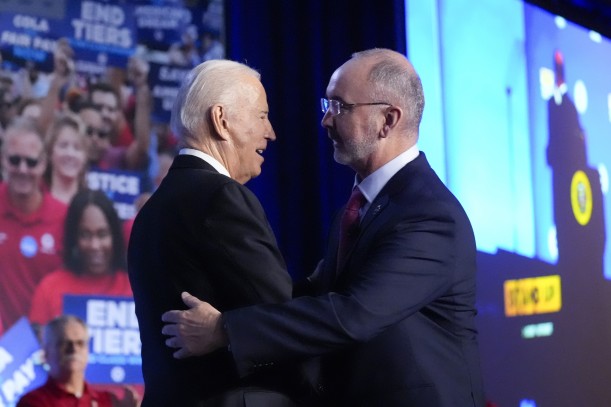What UAW Backing Means For Biden — And Why The Union’s Endorsement Took So Long

UAW President Shawn Fain, right, shakes hands with President Biden before endorsing his bid for reelection. (Alex Brandon / AP Photo)
The United Auto Workers has endorsed President Joe Biden’s bid for reelection in 2024. “Joe Biden has earned it,” said union president Shawn Fain on Jan. 24 as he announced the union’s decision to back the incumbent candidate.
The Conversation U.S. asked Marick Masters, a Wayne State University scholar of labor, politics and business issues, to explain why the UAW waited until now to endorse Biden and why this endorsement matters.
Why is the UAW endorsement significant?
The UAW’s endorsement provides symbolic and substantive support for the president.
Symbolically, it shores up Biden’s backing by organized labor – a critical constituency in an election year that promises a tight rematch between him and former President Donald Trump.
Recent national polls have leaned at least slightly in Trump’s favor, which means that Biden will have to mobilize voters in key battleground states like Michigan – where the largest number of the UAW’s 400,000 active and 580,000 retired members live – to win reelection.
Substantively, the endorsement clears the way for the deployment of the political muscle of this union to help get out the vote for Biden in November. Historically, the United Auto Workers has tried to help its members and the public in general become well informed about politics and elections and sought to mobilize voters for the candidates it endorses.
Although the ranks of organized labor in the U.S., including the UAW, have generally declined significantly since their heyday in the 1950s, the United Auto Workers has a formidable network in battleground states like Michigan, where roughly 130,000 of its members reside. Biden won Michigan by 154,000 votes in 2020, while Hillary Clinton lost it by just 11,600 votes in 2016.
Unions made about US$27.5 million in contributions to Biden’s 2020 campaign. While nominally a significant amount, it pales in comparison to the amount that businesses contributed. Biden’s 2020 bid was the first ever to draw more than $1 billion from donors.
UAW President Shawn Fain announced the union’s endorsement of President Joe Biden’s reelection bid.
What led to the delay in endorsing?
Rather than make an early endorsement of President Biden, in 2023 the United Auto Workers instead voiced dissatisfaction with the administration’s policy of accelerating the transition to electric vehicles.
From the union’s perspective, the Biden administration had not given labor rights adequate protection as the Big Three automakers formed joint ventures with foreign-based manufacturers of batteries to facilitate the industry’s transition to producing far more electric vehicles.
As the union prepared for its contract negotiations with General Motors, Ford and Stellantis – the global company that manufacturers Chrysler, Dodge and Jeep vehicles in the U.S. – the UAW hoped to exert whatever influence it could over lawmakers and the companies to open the joint ventures to union representation.
But Fain made it abundantly clear at the time, as he has done again and again, that Trump was not a viable alternative. He has repeatedly said that Trump’s election in 2024 would be “a disaster.”
And to be sure, the UAW didn’t endorse Biden’s 2020 candidacy until April 21 of that year. It moved faster this time.
How did UAW members vote in 2016 and 2020?
Despite widespread union endorsements of Hillary Clinton in 2016 and Biden in 2020, a significant percentage of union members cast their ballots for Donald Trump in both elections.
In 2016, 38% of union members voted for Trump compared with 58% for Clinton, according to University of Michigan researchers. In 2020, 40% of voters in union households voted for Trump compared with 56% for Biden.
That’s in line with the UAW’s partisan breakdown in prior elections. About 60% of UAW members and retirees have historically voted for Democratic Party candidates, according to Brian Rothenberg, a former union spokesman.
In close races, support from the United Auto Workers and the rest of organized labor could prove decisive, notwithstanding that the union’s membership has fallen from 1.5 million in the late 1970s to less than 400,000 today, and that overall the union membership rate in the U.S. workforce has shrunk to 10%.
And in states like Michigan and Pennsylvania, which have numerous union members, the United Auto Workers’ efforts on behalf of presidential candidates may tip the balance. Unions had roughly 564,000 members in Michigan in 2023, according to the Bureau of Labor Statistics.
Was there a chance that the UAW could have backed Trump?
No chance whatsoever.
The United Auto Workers would have condemned itself within the Democratic Party and progressive circles if it had broken with tradition and not endorsed the party’s candidate. Endorsing Trump would have forfeited the UAW’s leverage to influence the Biden administration’s policies regarding the transition to vehicle electrification.
“Donald Trump is a billionaire, and that’s who he represents,” Fain declared before making the union’s endorsement. “If Donald Trump ever worked in an auto plant, he wouldn’t be a UAW member, he’d be a company man trying to squeeze the American worker. Donald Trump stands against everything we stand for as a union, as a society.”
I believe that endorsing Trump would also have created an irreconcilable rift in the union itself with harmful fallout. And it would have alienated Biden, who showed his support for the union’s strikers in September 2023 by standing with them on the picket line – a first for any sitting president.
![]()
Marick Masters is a Professor of Business and Adjunct Professor of Political Science at Wayne State University. This article is republished from The Conversation under a Creative Commons license. Read the original article.
Category:
User login
Omaha Daily Record
The Daily Record
222 South 72nd Street, Suite 302
Omaha, Nebraska
68114
United States
Tele (402) 345-1303
Fax (402) 345-2351




